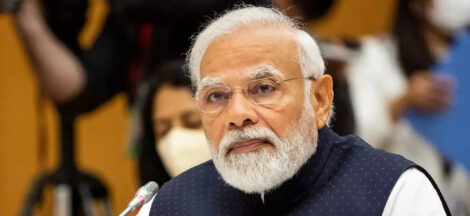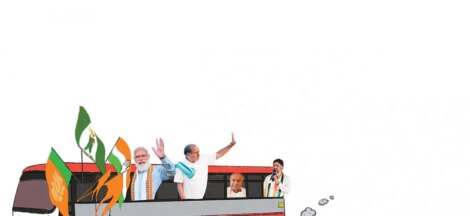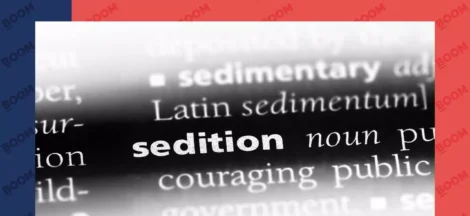By
Nilanjan Banik
In
recent past, a lot has been written about farm loan waivers. Studies have
pointed out loan waiver programmes do not make much economic sense (N. Banik
(2018) Are Loan Waivers a Panacea for Rural Distress? Economic and Political
Weekly). However, if current political discourse is any indication then loan
waiver is the flavour of the month.
If
not the farm loan waivers, what else to do to increase farm incomes? During the
year following loan waivers, small farmers lose out on three counts: lower
access to formal loan, falling agricultural revenue because of higher informal
loan cost, and falling agricultural productivity. This has wider implication on
income distribution. As many as 83 per cent of the farmers in India are
marginal and small-type, with less than 2 hectares of landholding. Although
these groups qualify for loan waivers, however, they don’t get the benefit as
they do not access formal (read bank) loans.
The
median annual income of these farmers is around $290, which is barely two
months’ minimum wage in Mumbai, the commercial capital of India. What
interventions, then, could be more helpful in increasing farm income in India?
After all, the current government wants to double farm income by 2022-2023 over
the base year of 2015–2016.
During
2015–2016, per-capita farm income was $1,693 per annum (in current price). To
double farm income by 2022–2023 it will require agriculture output to grow at
10.4 per cent annually. However, at present, the agriculture output is growing
at around 3 per cent annually. At this pace, it will take 25 years to double
farmers’ income. To boost an increase in farmers’ income, there could be
several other interventions.
Building
cold storage and warehouses: India is one of the largest producers of
agricultural perishables and yet nearly 20 per cent of India’s fresh produce is
wasted because of lack of adequate cold storage facilities. Reducing waste of
perishable fruits, vegetables, and milk that command higher market prices than
staple crops will augment farm income. Most small farmers do not risk growing
perishable crops. Because of the lack of storage facilities, small and marginal
farmers seldom venture to grow high-value crops. Only 22.2 per cent of marginal
farmers (with less than one hectare of landholding size) and 23.6 per cent of
small farmers (between one and two hectares of landholding size) grow
high-value crops. Small and marginal farmers are likely to gain from shifting
to high-value crops, after which the likelihood of a farmer being poor will be
3-7 per cent lower.
Linking
domestic market with international market: The present government has increased
budgetary allocation for agriculture sector, up from $17.04 billion (between
2009 and 2014) to $ 30 billion (between 2014 and 2019).This has led to an
increase in food and livestock production. For instance, pulse production has
increased on average by 10.5 per cent annually. Production of fish, milk, and
egg has increased by 26 per cent, 24 per cent, and 25 per cent respectively.
Although India allowed exports of livestock, the typical farm sector outputs
such as rice, wheat, and other dietary items are only restrictively allowed.
India also has higher import duties in comparison to the ASEAN level when it
comes to agricultural products. In short, trade in agriculture items is
restricted to tame domestic price, enable food security, and ensure the
livelihood of Indian farmers. However, a restricted agriculture market and lack
of adequate storage facilities often lead to crop output getting wasted. Food
grain production in India touched an all-time high of 280 million tonnes during
2017-2018, and there is need to follow a liberal trade policy and put in place
necessary infrastructures to facilitate exports. For instance, a necessary
condition for exports is to have testing facilities that provide sanitary and
phytosanitary certification. Unfortunately, the number of such testing
facilities is limited. Likewise, agriculture tariffs should be brought down to
allow imports at the time of shortage.
Supply-side
interventions: Building rural infrastructures such as village electrification
and canals will help. The fact that irrigation coverage on small landholding
size is less than 40 per cent means crop failures in bad rainfall years.
Likewise, a reform in the APMC Act is required. In a supply chain examination
study involving trade in potatoes, it was found that middlemen can charge a
commission of up to a staggering 70 per cent. For example, during June 2017 in
the Azadpur and Ghazipur markets of Delhi, the middlemen were selling a common
variety of potatoes at 7-9 cents per kilogram. If these rates were being
offered to the farmers they should have realized between $3.5 and $5 for a 50-
kilogram sack. However, in reality, the maximum price the farmers were offered
was $1.4 for a 50-kilogram sack. Hence, most often farmers do not know the
actual market prices of the commodities and it is the middlemen who siphon off
most of the profits. The lack of reforms in the APMC Act prevents small farmers
to sell directly to supermarkets, exporters, and agro-processors (thereby,
enhancing their income).
Financial
literacy: Lack of financial awareness has affected the growth and deepening of
agriculture finance markets. The National Centre for Financial Education (NCFE)
conducted India’s first-ever national benchmark survey of Financial Literacy
and Financial Inclusion in 2015, which captured a broad array of information
from 76,762 respondents. The survey highlighted that the farmers are not aware
of basic financial products. For example, less than 1.67 per cent of the
farmers are aware of crop insurance products. The corresponding numbers for
cattle/livestock insurance and agricultural futures are 0.66 per cent and 0.38
per cent respectively.
Even
introduction of e-mandis — an online market where farmers can bypass the
middlemen and sell directly to the retailers — are helping them a little.
Evidence from Rajasthan suggests that because of the introduction of an
e-market, farmers witnessed a price premium of 13 per cent. However, at
present, e-mandis are catering to only 7 per cent of all Indian farmers and
handles only around 2 per cent of the total value of the country’s agricultural
output. In conclusion, waivers of farm loans may help political parties win an
election once. For them to win an election twice, however, it is important to
undertake these aforementioned policies measures that will make a real
difference to the life of poor farmers.
(IPA Service)
The writer is
Professor, Bennett University, Greater Noida.
The post Loan Waivers Can’t Increase Farm Income appeared first on Newspack by India Press Agency.


